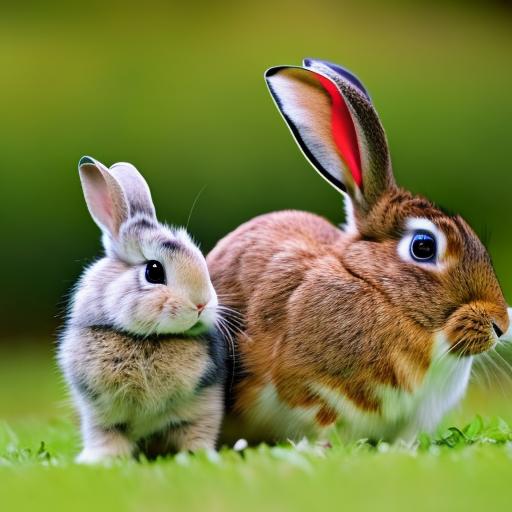Keeping rabbits and chickens together is a popular choice for many small-scale farmers and homesteaders. These two animals can provide numerous benefits when housed together, such as pest control and companionship. However, there are also potential drawbacks to consider, including health risks and aggression between the two species. In this article, we will explore the compatibility of rabbits and chickens, discussing their behaviors, housing requirements, feeding needs, health concerns, social interactions, and potential benefits and drawbacks.
Key Takeaways
- Rabbits and chickens can be compatible if managed properly.
- Understanding the behaviors of both animals is crucial for successful cohabitation.
- Housing should provide separate areas for each species to prevent territorial disputes.
- Feeding requirements differ between rabbits and chickens and should be monitored closely.
- Health concerns such as disease transmission and parasites should be addressed regularly.
Understanding the Behaviors of Rabbits and Chickens
Rabbits are social animals that thrive in the company of others. They are naturally curious and enjoy exploring their surroundings. Rabbits are also known for their digging behavior, as they create burrows to hide and nest in. On the other hand, chickens are flock animals that have a well-defined social hierarchy. They spend their days scratching the ground for food and dust bathing to keep themselves clean.
These natural behaviors can affect the compatibility of rabbits and chickens. For example, rabbits may be tempted to dig up chicken nests or burrow under fences if they are not provided with appropriate housing. Chickens may also peck at rabbits if they feel threatened or if the rabbits invade their territory. It is important to understand these behaviors in order to create a harmonious living environment for both animals.
Housing Considerations for Rabbits and Chickens
When it comes to housing rabbits and chickens together, there are a few key considerations to keep in mind. First, rabbits require a secure enclosure that protects them from predators and provides ample space for exercise. This can be achieved by using wire mesh or solid fencing around the perimeter of their living area. Additionally, rabbits need a sheltered space where they can retreat from extreme weather conditions.
Chickens, on the other hand, need a coop that is well-ventilated and provides protection from predators. The coop should have nesting boxes for egg-laying and perches for roosting. It is important to ensure that the coop is large enough to accommodate the number of chickens you have, as overcrowding can lead to stress and aggression.
To create a safe and comfortable living space for both animals, it is recommended to have separate areas within the enclosure for rabbits and chickens. This can be achieved by using wire mesh or solid dividers. This allows each species to have their own space while still being able to interact with each other.
Feeding Requirements for Rabbits and Chickens
Rabbits and chickens have different dietary needs, so it is important to provide appropriate food and water for both animals. Rabbits are herbivores and require a diet that is high in fiber. They should be fed a mix of hay, fresh vegetables, and a small amount of pellets. It is also important to provide fresh water at all times.
Chickens, on the other hand, are omnivores and require a balanced diet that includes grains, seeds, fruits, vegetables, and protein sources such as insects or mealworms. They also need access to grit, which helps them digest their food properly. Fresh water should also be provided at all times.
When feeding rabbits and chickens together, it is important to ensure that each animal has access to their own food and water sources. This can be achieved by using separate feeders and waterers for each species. It is also important to monitor their food intake to prevent overeating or nutrient deficiencies.
Health Concerns when Keeping Rabbits and Chickens Together
Keeping rabbits and chickens together can pose potential health risks for both animals. Rabbits are susceptible to diseases such as coccidiosis, which can be transmitted through contaminated feces from chickens. Chickens, on the other hand, can contract diseases such as pasteurellosis from rabbits.
To prevent these health issues, it is important to keep the living area clean and free from feces. Regularly cleaning and disinfecting the enclosure can help reduce the risk of disease transmission. It is also important to provide each animal with their own separate food and water sources to prevent cross-contamination.
If any signs of illness are observed in either the rabbits or chickens, it is important to seek veterinary care immediately. Early detection and treatment can help prevent the spread of disease and ensure the health and well-being of both animals.
Managing Social Interactions between Rabbits and Chickens

Rabbits and chickens can have different social behaviors, so it is important to manage their interactions to prevent aggression. Rabbits are generally non-aggressive animals, but they may become territorial if they feel threatened. Chickens, on the other hand, have a well-defined social hierarchy and may peck at rabbits if they feel their territory is being invaded.
To manage their social interactions, it is recommended to introduce rabbits and chickens gradually. This can be done by placing them in separate enclosures within close proximity to each other. This allows them to become familiar with each other’s presence without direct contact.
Once they are comfortable with each other’s presence, supervised introductions can be made. This can be done by allowing them to interact in a neutral space while closely monitoring their behavior. If any signs of aggression are observed, such as pecking or chasing, it is important to separate the animals immediately.
Preventing Aggression between Rabbits and Chickens
Aggression between rabbits and chickens can be prevented by providing each animal with their own separate living space within the enclosure. This can be achieved by using wire mesh or solid dividers to create separate areas for each species. This allows them to have their own territory while still being able to interact with each other.
It is also important to provide each animal with their own food and water sources to prevent competition and aggression. This can be achieved by using separate feeders and waterers for each species. It is also important to monitor their behavior during feeding time to ensure that each animal has access to their own food and water.
If any signs of aggression are observed, it is important to separate the animals immediately. This can be done by using temporary fencing or by providing each animal with their own separate enclosure. It is also important to monitor their behavior closely after any aggressive incidents to ensure that they are not injured or stressed.
Potential Benefits of Keeping Rabbits and Chickens Together
Despite the potential challenges, there are numerous benefits to keeping rabbits and chickens together. One of the main benefits is pest control. Rabbits are known for their ability to eat a wide variety of plants, including weeds and garden pests. Chickens, on the other hand, are excellent at controlling insects such as flies and mosquitoes. By keeping rabbits and chickens together, you can create a natural pest control system that helps keep your garden or farm healthy.
Another benefit of keeping rabbits and chickens together is companionship. Both animals are social creatures that enjoy the company of others. By housing them together, you can provide them with a sense of companionship and reduce the risk of loneliness or boredom.
There are also practical benefits to keeping rabbits and chickens together. For example, rabbits produce manure that can be used as fertilizer for your garden or farm. Chickens, on the other hand, produce eggs that can be consumed or sold. By combining these two animals, you can create a sustainable system that provides both food and fertilizer.
Potential Drawbacks of Keeping Rabbits and Chickens Together
While there are many benefits to keeping rabbits and chickens together, there are also potential drawbacks to consider. One of the main drawbacks is the risk of disease transmission between the two species. As mentioned earlier, rabbits and chickens can transmit diseases to each other through contaminated feces. This can pose a serious health risk and may require additional precautions to prevent disease transmission.
Another potential drawback is aggression between rabbits and chickens. While rabbits are generally non-aggressive animals, they may become territorial if they feel threatened. Chickens, on the other hand, have a well-defined social hierarchy and may peck at rabbits if they feel their territory is being invaded. This can lead to stress and injury for both animals.
It is also important to consider the space requirements for both rabbits and chickens. Rabbits require a large enclosure that provides ample space for exercise, while chickens need a coop that is large enough to accommodate their flock size. If space is limited, it may be challenging to provide adequate housing for both animals.
Weighing the Pros and Cons of Keeping Rabbits and Chickens Together
In conclusion, keeping rabbits and chickens together can provide numerous benefits, such as pest control and companionship. However, there are also potential drawbacks to consider, including health risks and aggression between the two species. Before making a decision, it is important to carefully weigh the pros and cons and consider the specific needs of both animals. By providing appropriate housing, feeding, and social management, you can create a harmonious living environment for both rabbits and chickens.
If you’re considering keeping rabbits and chickens together, it’s important to understand the dynamics between these two animals. While they can coexist peacefully, there are certain factors to consider. For more information on this topic, check out this informative article on Poultry Wizard’s website: Can You Keep a Rabbit with Chickens? This article provides valuable insights and tips on how to successfully integrate rabbits into a chicken coop environment.
FAQs
Can you keep a rabbit with chickens?
Yes, it is possible to keep a rabbit with chickens. However, there are some important considerations to keep in mind before doing so.
What are the benefits of keeping a rabbit with chickens?
Keeping a rabbit with chickens can provide companionship for both animals and can also help with pest control in the chicken coop.
What are the potential problems with keeping a rabbit with chickens?
Rabbits and chickens have different dietary needs, so it is important to ensure that each animal is getting the appropriate food. Additionally, rabbits can be territorial and may become aggressive towards chickens if they feel threatened.
How can you introduce a rabbit to a chicken coop?
It is important to introduce a rabbit to a chicken coop slowly and carefully. Start by placing the rabbit in a separate enclosure within the coop and gradually allow them to interact with the chickens under supervision.
What should you do if the rabbit and chickens do not get along?
If the rabbit and chickens do not get along, it is important to separate them immediately to prevent injury to either animal. Consider providing separate enclosures for each animal.
Meet Walter, the feathered-friend fanatic of Florida! Nestled in the sunshine state, Walter struts through life with his feathered companions, clucking his way to happiness. With a coop that’s fancier than a five-star hotel, he’s the Don Juan of the chicken world. When he’s not teaching his hens to do the cha-cha, you’ll find him in a heated debate with his prized rooster, Sir Clucks-a-Lot. Walter’s poultry passion is no yolk; he’s the sunny-side-up guy you never knew you needed in your flock of friends!







